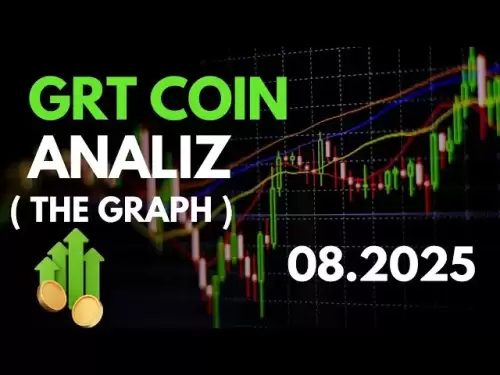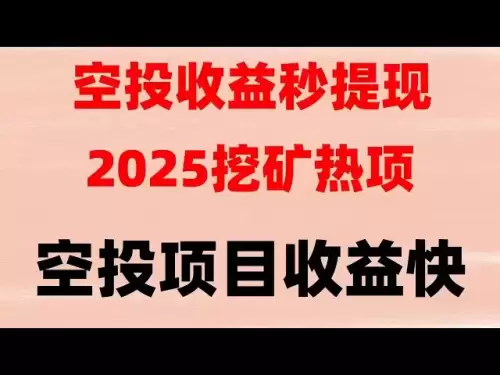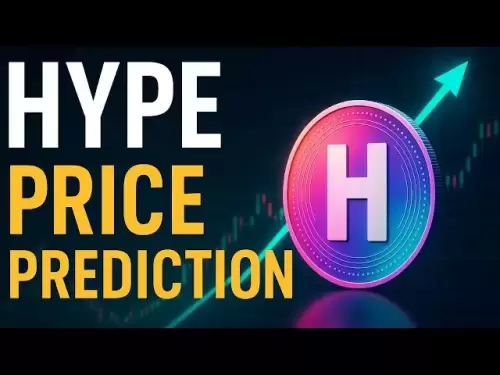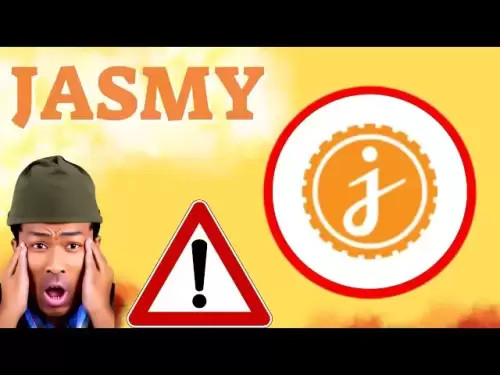-
 Bitcoin
Bitcoin $119300
2.40% -
 Ethereum
Ethereum $4254
-0.20% -
 XRP
XRP $3.184
-1.38% -
 Tether USDt
Tether USDt $1.000
0.00% -
 BNB
BNB $803.9
0.58% -
 Solana
Solana $183.1
1.50% -
 USDC
USDC $0.0000
0.01% -
 Dogecoin
Dogecoin $0.2339
-2.87% -
 TRON
TRON $0.3384
0.88% -
 Cardano
Cardano $0.8018
-0.29% -
 Hyperliquid
Hyperliquid $45.13
3.14% -
 Chainlink
Chainlink $22.10
0.96% -
 Stellar
Stellar $0.4439
-0.94% -
 Sui
Sui $3.875
-0.73% -
 Bitcoin Cash
Bitcoin Cash $570.7
0.24% -
 Hedera
Hedera $0.2589
-2.90% -
 Ethena USDe
Ethena USDe $1.001
-0.01% -
 Avalanche
Avalanche $23.83
-1.73% -
 Litecoin
Litecoin $123.8
2.61% -
 Toncoin
Toncoin $3.351
-1.13% -
 UNUS SED LEO
UNUS SED LEO $9.103
1.13% -
 Shiba Inu
Shiba Inu $0.00001356
-1.40% -
 Uniswap
Uniswap $10.93
-0.19% -
 Polkadot
Polkadot $4.057
-1.97% -
 Dai
Dai $1.000
0.01% -
 Cronos
Cronos $0.1646
4.66% -
 Ethena
Ethena $0.7974
8.11% -
 Pepe
Pepe $0.00001208
-2.89% -
 Bitget Token
Bitget Token $4.445
-1.70% -
 Monero
Monero $268.8
-2.00%
Where can I find the white paper for the Request (REQ) coin?
The Request (REQ) white paper presents a comprehensive analysis of the REQ coin's utility, economics, and potential success within the competitive landscape of request-for-payment coins.
Dec 25, 2024 at 05:21 am
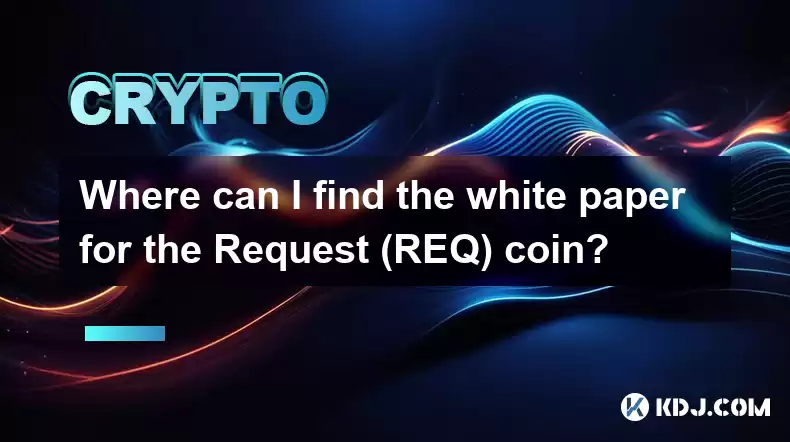
Whitepaper Analysis: Request (REQ) Coin
Key Points:
- Definition of Request (REQ)
- Detailed explanation of the Request Network
- Analysis of the REQ coin's utility and economics
- Comparison of REQ to other request-for-payment coins
Request (REQ) Coin: An Overview
Request is a decentralized payments network that allows users to send and receive payments globally without the need for intermediaries. It uses the REQ token as its native currency, which facilitates secure and efficient transactions.
The Request Network
The Request Network consists of two main components:
- Request Invoicing: Allows businesses to create and send invoices to their customers. Customers can then pay these invoices using a variety of cryptocurrencies, including REQ.
- Request Payments: Enables individuals and businesses to make payments to anyone worldwide, regardless of their location or currency.
REQ Coin Utility and Economics
The REQ token serves several key functions within the Request Network:
- Transaction Fees: REQ is used to pay transaction fees on the Request Network. These fees incentivize nodes to process requests and ensure network security.
- Governance: REQ holders can participate in the governance of the Request Network by voting on proposals and electing delegates to represent their interests.
- Staking: REQ holders can stake their tokens to earn rewards and participate in consensus on the network.
Comparison to Other Request-for-Payment Coins
REQ faces competition from several other request-for-payment coins, including:
- Stellar (XLM): A decentralized payments network focused on cross-border payments.
- Ripple (XRP): A payments network designed for the financial industry.
- Metal (MTL): A blockchain-based payments platform that aims to provide a cashless society.
Each of these coins has its own unique features and advantages, and REQ's success will depend on its ability to differentiate itself and provide a compelling value proposition to users.
Whitepaper Analysis: Key Takeaways
The Request (REQ) white paper provides a comprehensive overview of the Request Network, its economic model, and the utility of the REQ token. Key takeaways include:
- Request is a decentralized payments network that aims to facilitate global payments without intermediaries.
- The REQ token is used as the native currency for the Request Network and serves various functions, including transaction fees, governance, and staking.
- REQ faces competition from other request-for-payment coins, but it has the potential to succeed by providing a user-friendly interface, low transaction fees, and a strong community.
FAQs
1. What is the Request Network?
The Request Network is a decentralized payments network that allows users to send and receive payments globally without the need for intermediaries.
2. What is the REQ token used for?
The REQ token is used as the native currency for the Request Network and serves various functions, including transaction fees, governance, and staking.
3. What are the benefits of using the Request Network?
The Request Network offers several benefits, including low transaction fees, fast and secure transactions, and the ability to make payments to anyone worldwide.
4. How can I obtain REQ tokens?
REQ tokens can be purchased on various cryptocurrency exchanges, including Coinbase and Binance.
5. Is REQ a good investment?
The potential return on investment for REQ will depend on several factors, including the adoption of the Request Network, the regulatory environment, and the performance of the cryptocurrency market as a whole.
Disclaimer:info@kdj.com
The information provided is not trading advice. kdj.com does not assume any responsibility for any investments made based on the information provided in this article. Cryptocurrencies are highly volatile and it is highly recommended that you invest with caution after thorough research!
If you believe that the content used on this website infringes your copyright, please contact us immediately (info@kdj.com) and we will delete it promptly.
- MultiBank Group, Record Results, and the $MBG Token: A New Era?
- 2025-08-11 14:50:12
- Bitcoin FilmFest 2026: Warsaw's Unexpected Crypto-Cinema Blockbuster
- 2025-08-11 14:30:12
- MultiBank Group's Record Results and the Rise of the MBG Token: A New Era in Finance?
- 2025-08-11 14:30:12
- Solana Price, Altcoin Throne, and Layer Brett: Who Will Reign Supreme?
- 2025-08-11 14:55:17
- Cryptos to Watch in 2025: Analyst Picks & Meme Coin Mania
- 2025-08-11 15:00:13
- Dogecoin, Toncoin, and Cold Wallet: Navigating Crypto's Latest Waves
- 2025-08-11 12:30:11
Related knowledge

How to purchase Aragon (ANT)?
Aug 09,2025 at 11:56pm
Understanding Aragon (ANT) and Its PurposeAragon (ANT) is a decentralized governance token that powers the Aragon Network, a platform built on the Eth...

Where to trade Band Protocol (BAND)?
Aug 10,2025 at 11:36pm
Understanding the Role of Private Keys in Cryptocurrency WalletsIn the world of cryptocurrency, a private key is one of the most critical components o...

What is the most secure way to buy Ocean Protocol (OCEAN)?
Aug 10,2025 at 01:01pm
Understanding Ocean Protocol (OCEAN) and Its EcosystemOcean Protocol (OCEAN) is a decentralized data exchange platform built on blockchain technology,...

Where can I buy UMA (UMA)?
Aug 07,2025 at 06:42pm
Understanding UMA and Its Role in Decentralized FinanceUMA (Universal Market Access) is an Ethereum-based decentralized finance (DeFi) protocol design...

How to buy Storj (STORJ) tokens?
Aug 09,2025 at 07:28am
Understanding Storj (STORJ) and Its Role in Decentralized StorageStorj is a decentralized cloud storage platform that leverages blockchain technology ...

What is the best app to buy Nano (NANO)?
Aug 09,2025 at 03:35am
Understanding Nano (NANO) and Its Unique FeaturesNano is a feeless, instant cryptocurrency designed for fast peer-to-peer transactions. Unlike many ot...

How to purchase Aragon (ANT)?
Aug 09,2025 at 11:56pm
Understanding Aragon (ANT) and Its PurposeAragon (ANT) is a decentralized governance token that powers the Aragon Network, a platform built on the Eth...

Where to trade Band Protocol (BAND)?
Aug 10,2025 at 11:36pm
Understanding the Role of Private Keys in Cryptocurrency WalletsIn the world of cryptocurrency, a private key is one of the most critical components o...

What is the most secure way to buy Ocean Protocol (OCEAN)?
Aug 10,2025 at 01:01pm
Understanding Ocean Protocol (OCEAN) and Its EcosystemOcean Protocol (OCEAN) is a decentralized data exchange platform built on blockchain technology,...

Where can I buy UMA (UMA)?
Aug 07,2025 at 06:42pm
Understanding UMA and Its Role in Decentralized FinanceUMA (Universal Market Access) is an Ethereum-based decentralized finance (DeFi) protocol design...

How to buy Storj (STORJ) tokens?
Aug 09,2025 at 07:28am
Understanding Storj (STORJ) and Its Role in Decentralized StorageStorj is a decentralized cloud storage platform that leverages blockchain technology ...

What is the best app to buy Nano (NANO)?
Aug 09,2025 at 03:35am
Understanding Nano (NANO) and Its Unique FeaturesNano is a feeless, instant cryptocurrency designed for fast peer-to-peer transactions. Unlike many ot...
See all articles





















